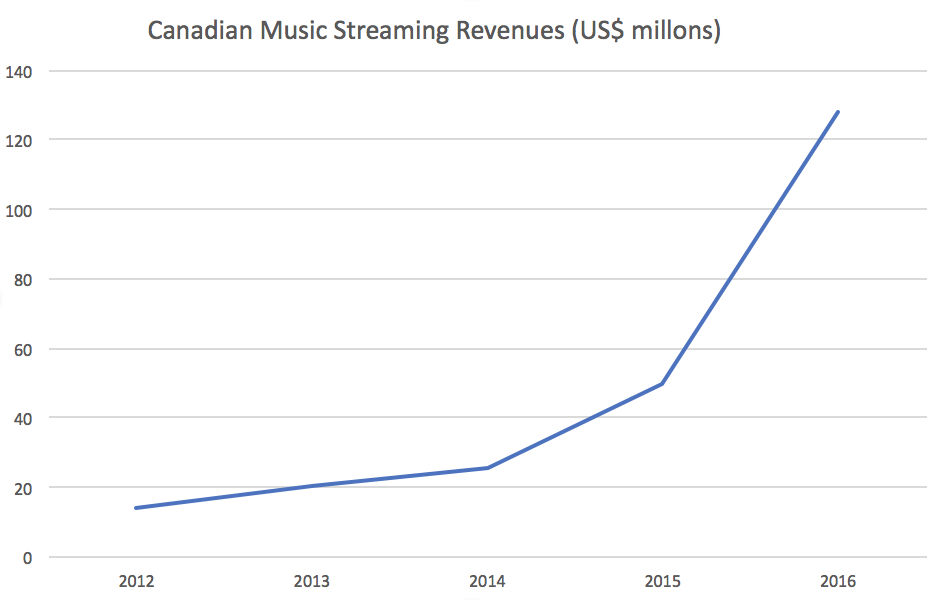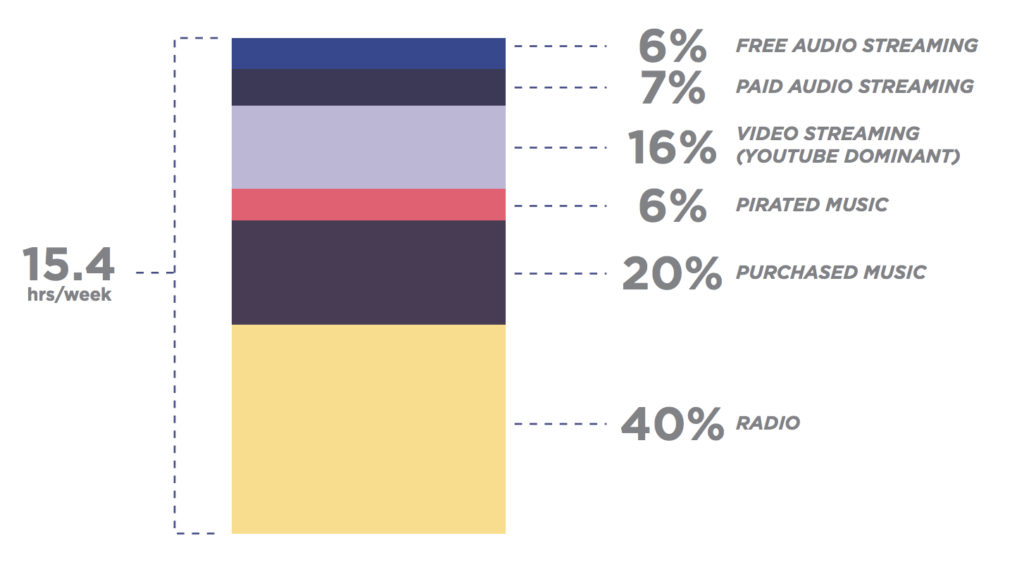Music Canada Data Confirms Huge Increase in Streaming Revenues and Sharp Decline of Music Listening from Pirated Sources
Music Canada released a report on the so-called Value Gap last month which serves as the basis for its lobbying campaign for copyright reform in Canada. The industry lobby group has used the value gap rhetoric primarily as an argument to undo safe harbours for Internet intermediaries. As I noted earlier this year, the argument is poor fit in Canada. First, Canada has experienced massive growth of Internet streaming revenues, with the Canadian music market outpacing global competitors by almost any metric and revenues going to both the industry and creators.
Yesterday I posted on SOCAN generating a 10X increase in Internet streaming revenues with growth rates of over 100 per cent over the past year for songwriters, composers, and music publishers. The industry numbers from Music Canada and IFPI tell a similar story. According to industry data, the Canadian music market is growing much faster than the world average (12.8 per cent in 2016 vs. 5.9 per cent globally), streaming revenues more than doubled last year to US$127.9 million (up from US$49.82 million) growing far faster than the world average of 60.4 per cent, the Canadian digital share of revenues of 63 per cent is far above the global average of 50 per cent, and Canada has leaped past Australia to become the 6th largest music market in the world. In fact, as the chart below indicates, the growth of streaming revenues in Canada since the 2012 copyright reforms has increased significantly year-after-year with growth rates for the industry and collectives mirroring each other.

Canadian Music Streaming Revenues, Source: IFPI Global Music Report 2017, p. 80, referenced at p. 19, https://musiccanada.com//wp-content/uploads/2017/10/The-Value-Gap-Its-Origins-Impacts-and-a-Made-in-Canada-Approach.pdf
Second, the U.S. DMCA notice-and-takedown system, which the industry claims is to blame lower royalty rates on YouTube, does not exist in Canadian law. Music Canada wants government intervention into what amounts to a negotiated agreement by increasing potential liability for intermediaries in the hope of extracting better terms and higher royalty rates. However, focusing on Canadian copyright law to do so makes little sense since there is no notice-and-takedown system to amend.
The Value Gap report may fail to make the case for Canadian legislative reform, but it does point to the sharp decline of Canadians who rely on pirated music. The report cites data from an IFPI international report on the listening habits of music consumers around the world. That report provided few details on the situation in Canada, but Music Canada discloses previously unreleased information specifically on Canadian consumers. It reports that Canadians spend 15.4 hours per week listening to music with listening to pirated music only accounting for 6 per cent of that time. A range of authorized and compensated sources, including radio, downloads, and streaming represents the vast majority of music listening habits. In other words, the industry’s data confirms that Canadian consumers show little interest in listening pirated music, preferring many other sources that contribute to its fast growing revenues.

Music Canada, The Value Gap and Its Origins, Impacts, and a Made in Canada Approach, Page 22, https://musiccanada.com//wp-content/uploads/2017/10/The-Value-Gap-Its-Origins-Impacts-and-a-Made-in-Canada-Approach.pdf
Moreover, the same report found that Canada is well below global averages in downloading music from unauthorized sites or stream ripping from sites such as YouTube. Indeed, after years of implausibly claiming that Canadians were among the most active infringers, Music Canada now points to survey data that places Canada far below the global average. Canada is also notably far below the global average when it comes to smartphone use for music (only Japan ranks below Canada), which is likely a function of the high cost of data in Canada.
The so-called value gap will undoubtedly form a big part of the lobbying effort on copyright reform in Canada for the music industry (other sectors, including the publishing industry, have also recently adopted it notwithstanding the significant growth in education licensing spending since 2012). Yet politicians should not be so easily fooled: the industry’s own data points to a major digital success story coming on the heels of the 2012 copyright reforms with a surge in revenues and rapidly declining relevance of pirated music.
The post Music Canada Data Confirms Huge Increase in Streaming Revenues and Sharp Decline of Music Listening from Pirated Sources appeared first on Michael Geist.
Comments
Post a Comment